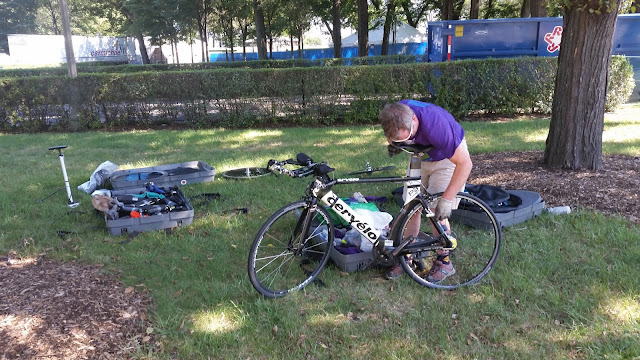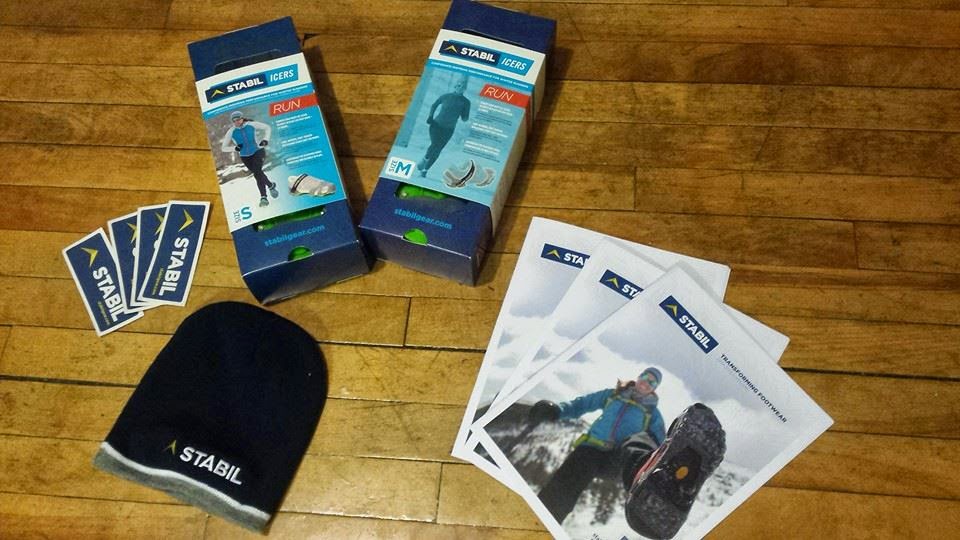I was reacently intervied about ny training and racing by Rachel Brown who writes for the Berlin Daily Sun. She told me the story would be in newspaper. I had no idea I have a nearly life size photo of me on the front page with an extended story to follow!
Meghan Skidmore is a tip-top athlete, a triathlete to be exact. But
it wasn't always that way. A good athlete in her youth — she says she
played soccer in high school in
Connecticut — she didn't get hooked on triathlons until she tried one while in college in
Vermont.
"There was a triathlon (in college) in spring; I tried, I did it. I
don't remember how well I did. It was a pool swim, a bike and then a
run, the spring of 2007," says the 30-year-old, affable and very fit
Skidmore.
Skidmore's next triathlon was that summer at
Webster Lake,
Webster, Mass.
"That was my first official triathlon, I really wanted to do one.
There was not a lot of training, just biking and running, no coach," she
says.
Now she has a coach, and the game has changed for her: Something inside her just wants to become better and better.
Skidmore was on hand at Great Glen Trails, where she works full-time,
as does her agent Regina Ferreira, to talk about her experiences, her
dedicated training with coach Steve Vosburgh, her goal to obtain her Pro
Triathlon license in 2015, an accomplishment that would put her in the
elite-pro category with the opportunity to become professional.
She has her sights set on the 2015 World Triathlon Championships in
Chicago on Sept. 15.
Skidmore explains a triathlon is a swim, bike and run in that order, they vary in length.
"Half Ironman and Ironman are typically longer. A sprint is a
half-mile swim, 12-mile bike ride, 3.1-mile or 5K run; Olympic is a mile
swim, actually 0.9, 24-mile bike ride, 6.2-mile or 10K run; a Half
Ironman is a 1.2-mile swim, 56-mile bike ride and half marathon — 13.1
miles; and a full Ironman is a 2.4-mile swim, 112-mile bike ride and a
full marathon — 26.2 miles," explains Skidmore. She says pros complete
an Ironman in eight to nine hours while amateurs may take 13 to 17 to
finish.
Skidmore typically competes in the Olympic Triathlon. On April 26,
she completed the 5150 St. Anthony's Triathlon Olympic (Elite) in
St. Petersburg, Fla.
"This was the earliest in the season for me. I learned so much from that
race. Not saying that you can buy experience, but I guess I did because
of the cost to enter the race. Now I know what the bar is," she says,
smiling.
"The biggest thing in this race that added to my time was the swim. The
average time was 25 to 27 minutes. I did it in 35 minutes. It was the
first time in open water in the ocean. It was choppy, swelly; it was in a
cove, but the waves still come in," says Skidmore, who trains indoors
with Vosburgh at the White Mountain Aquatic Center, outdoors at
Echo Lake and from
First Bridge in
North Conway on the
Saco River.
"To prepare, I watched some videos with Steve. We could look at the
bike course before. It was in the city and the roads were closed for the
race, mostly through small neighborhoods and it was flat, not like
training here. It was 82 degrees with humidity," she says.
How did she do in
Florida?
She wrote on her blog: "My feet hurt and my legs were noodles, but I
did it. I raced with the elites. I finished in two hours and 34 minutes,
placing me 8th of 13 in the elite women and 33 of 48 men."
"The top girl to beat finished in two hours. To meet requirements for
the pro card, I have to finish within 8 percent of the top female
finisher. For me, it would have been two hours 12 minutes. I finished in
two hours 34 minutes," she says.
Some races are entered by age categories, represented in four-year increments, while some are elite races with no age category.
"It is easy to be competitive in an age group, in the elite /pro
race, age groups disappear. I race with a girl who is 14," she says.
The elite/pro races are important for Skidmore to reach her next
level, and they must be races with a cash prize. The race in St.
Petersburg gave away $33,000. The top female was awarded $10,000.
"I was pretty successful last year — overall female, the next level
is elite-pro and to break in you have to apply for the pro card. Elite
and pro are pretty much the same. The USAT (USA Triathlon) use pro and
elite interchangeably for the pro card, but some races have pro and
elite classes, it can be confusing, a gray area," she adds.
To obtain the pro card, Skidmore must find races awarding over $5,000
in prizes in the Olympic category. She says the cash Olympic races are
hard to find. Half Ironman and Ironman with over $5,000 cash prizes are
more plentiful.
"I think the reason is cash draws more competition," says Skidmore, adding there is a cash prize calendar to help find races.
And if she obtains her pro card and becomes pro, what next?
"After pro card, am I ready to be a pro,?" she asks.
She responded: "There are two ways to be a pro: You could be fully
sponsored, train a lot more, do meet and greets, race some races and
maybe earn some money or not. I think I can have a pro card and still
work. How much more can I push myself mentally and physically?
If I had
more time, it would benefit me, but I am still getting pretty good time," she says adding that finding sponsors is a full-time job.
"People don't just jump at you and give you money. You have to work hard," she adds.
But first she has to find the races in which to qualify and there is the cost of entering the races.
"You have to have criteria going to races.
Florida was expensive — $1,000. The five elite races are super expensive. I may not be able to go to others," she adds.
That's where fundraising comes in.
Her Team Skidmore and agent Ferreira work hard to raise money. Skidmore, who lived in
Randolph
and in the employee cottages at Great Glen during the summer, reached
out to businesses north of the Notch for support. Three years ago, she
moved to
Intervale to be closer to her coach and to the White Mountain Aquatic Center.
There are some events planned for north and south of the Notch to help raise funds:
• Shannon Door Restaurant and Team Skidmore will be hosting a benefit night on May 28.
• Berlin Bowling Center will host Skidmore Bowling Benefit Night, June 13.
•
Libby's Bistro hosts a benefit night July 9.
Skidmore, who also gives back to the community, wishes to thank businesses for supporting her:
Mount Washington Auto Road
and Great Glen Trails, Gorham Family Dentistry, Northconwaylodging.com, Mount Washington Valley Bicycling Club, Stan and
Dan Sports, White Mountain Aquatic Center, Comfort Inn & Suites,
Peak Health Sports Massage,
Top Notch Inn, Jay's Quick Lube, Gorham Hardware, Pollock Photo, Smith & Town Printers, Skratch Labs Hydration and Stabil Icers.
Skidmore also invites anyone who would like to do a training run with her, whether it be easy or hard, to zip her an e-mail:
megskidmore@gmail.com.
Speaking of training, coach Vosburgh and Skidmore connect.
"There are no words to say how grateful I am to Steve. He keeps it
fun, fresh, never boring. We have toys in the pool. He is so
technique-oriented, to get the extra edge," says Skidmore.
They met at Great Glen Trails, where Skidmore works.
"Steve skis and bikes at Great Glen, and we got to talking back in
2010 about my hobby, and he gave me some suggestions for my first Half
Ironman. We continued working together after that race," says Skidmore,
adding that Vosburgh is the Nordic ski coach at
Kennett High School.
Here is a typical day of training.
"Tomorrow, before I go to work, a one-hour swim at the aquatic center. We will transition to outside at
Echo Lake. We sometimes swim at
First Bridge
downstream to where it bends and gets shallow and then upstream past
the bridge," says Skidmore, who works at least an eight-hour day in an
active position, skiing, taking photos on the
Mount Washington Auto Road.
After work, it is a brick work out.
"It is either 1
½-hour bike or one-hour run, either or
both. You have to train your muscles, and you do the workout in the
swim/bike order. If you do a hard bike and a hard run, your legs feel
like bricks," she explains saying you train like that so come race day
your body isn't saying, 'What are you doing?'"
Then it is home, shower, have some dinner and sleep.
"Sleep never seems long enough. Still haven't found time to manage
everything. Although I have Regina, I still must post race results on my
blog. Having a social life is important, but I am not a night owl," she
grins.
It would be hard to be a night owl with six days of specific training
and one day off. But it really isn't a day off; it is a recovery day.
"In the winter, Sunday is a free day but an active day. I either ski
or go snowboarding. In the summer, it is Monday, some physical activity,
but unstructured," she says.
Skidmore and Vosburgh work with an online training program.
"I have an online log. Steve gives me my workouts. I write down what I
did, how I felt. He can log in and see how I am feeling. We talk every
day. I also have a computer on my bike, (an aerodynamic, triathlon
Cannondale Slice bicycle) which can take me through zones one to five.
It is really wattage goals; you go by those numbers," she says.
Skidmore can't say enough about Vosburgh's coaching technique.
"The cool thing about Steve, he knows how to layer things in, knows
the psychology of training. There are some workouts we wouldn't have
done two years ago. Even though he never raced in a triathlon, he is so
in tune with a training plan, reading books, watching videos. He is like
a sponge," says Skidmore, adding that Vosburgh biked competitively
since his early teens, has a strong background and ran track.
And there is that devotion.
"Steve is so dedicated to train me. It is just as easy to be dedicated to train with him," adds Skidmore.
For more information visit: www.skidmoreracing.blogsport.com, or call Ferreira at (603) 915-6665.







































